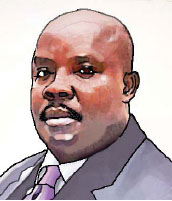By Emeka Alex Duru
(08054103327, nwaukpala@yahoo.com)
My encounter with the late strongman of Ibadan politics, Lamidi Adedibu, in 2003, took me into the deeper workings of Nigeria’s politics. Adedibu was obviously a king of sort, or more, from what I saw that day.
One thing that struck me most, was that virtually every word from him, elicited nods or cheers from his audience who came around for one favour or another. Some even prostrated as a gesture of deference when he glanced up in their direction. It was almost a competition to attract the chief’s attention.
In an interview later, he mumbled an expression that an aide interpreted to mean, “Everything happens here. Whoever will be anything in the state starts here”. That encapsulated the magnitude of his power and clout. He was really in charge. From people like him, you would properly understand the expression, ‘might is right’, in Nigeria’s politics.
The story was that Adedibu was not adequately lettered but had been involved in Oyo politics since the 1950s. He was said to have started off as a butcher and small-time organizer of political thugs for the Action Group party of late Chief Obafemi Awolowo. By the late 1980s, however, he had emerged as a powerful political force through what many attributed to a combination of populist politics, patronage, violence, and extortion. He fully unfurled in the days of General Ibrahim Babangida and particularly, the civilian dispensation of President Olusegun Obasanjo, when he played controversial roles in the enthronement and dethronement political office holders in Oyo state.
His politics was weird, lacking in democratic principles but essentially driven by Machiavellian tendencies, occasionally tinged with violence and intimidation at perceived opponents. He switched political camps, oscillating from the then All Peoples Party (APP) to Peoples Democracy Party (PDP), depending on where he felt he would command events and call the shots. On account of his bizarre political strategies, those opposed to him were scared out of the scene and the coast was cleared for him to maneuver. It was on the strength of this that he had his way in throwing up Rasheed Ladoja as governor in 2003 and replacing him with Adebayo Alao-Akala, four years after, when disagreement erupted between them over the control of the state’s politics and resources. What gladdened him most was being referred to as Garrison Commander of the state’s politics. Oyo is yet to recover from the vice grip of that era.
Adedibu’s suffocating hold on Oyo, is just an instance of the garrison politics that has characterized our current civilian rule. It is more of a rule of the thumb than an expression of the people’s mandate. When Obasanjo, for instance, against all expectations and in clear violation of the party’s guidelines, was imposed on the PDP as its presidential candidate in 1998, the action unwittingly set the party on a steady slide that eventually swept it out of power at the national level and in some states in 2015. It all started with Obasanjo coming to power with palpable vengeance and seizing the entire decision making organs of the PDP and dispensing with officials of the state at various arms of the government at will. That bullish disposition signaled the commencement of the regime of impunity presently pervading the land. Incidentally, there is nothing suggesting that it will blow over in the nearest future. Whenever a people’s will is twisted of circumscribed for whatever cravings of a few, the ghost returns to haunt the polity.
Politicians of the garrison orientation are like soldiers of fortune, who do not have defined stake in a war except what it fetches them. They are worse than mercenaries. Even as they rape the people, they brandish a certain entitlement carriage that sells the impression that much is owed them by the people. At any point in time, it is what they game that matters to them and not the interest of the state.
So, no matter the number of national chairmen the ruling All Progressives Congress (APC), chooses to turn over within a space of five years, the crisis in the party will not abate as long as it operates on the rules of the garrison. What the party can achieve, at most, is what Daron Acemoglu and James Robinson, described in their brilliant book, “Why Nations Fail”, as the iron law of oligarchy. It is a vicious circle in which new leaders overthrowing old ones with promises of radical change, bring nothing but more of the same.
At the root of the problem with Nigeria’s contemporary political elite is absence of vision and discipline. The existing political parties are also bereft of identifiable ideologies. Contrary to the understanding of political parties as forums for aggregation of ideas for leadership what we currently have are rallies for appropriation and disbursement of the common wealth by any particular group in power. In that case, the cry for the development of the country will continue to remain forlorn.
When therefore some lament that the country is lacking in leadership, it is not as if there are not people at various offices and positions. Leadership goes beyond that. It is more demanding and encompassing. It entails sacrifice. It involves mobilising the people and showing them the way. It also calls for a large dose of insight, emotional stability and high intellectual equipment. Leadership is not a vocation for jobber or journeymen. It is a conscious engagement by men and women with character, courage and carriage. Anything outside this, is mere pretension to the throne. That is the current problem with Nigeria.













